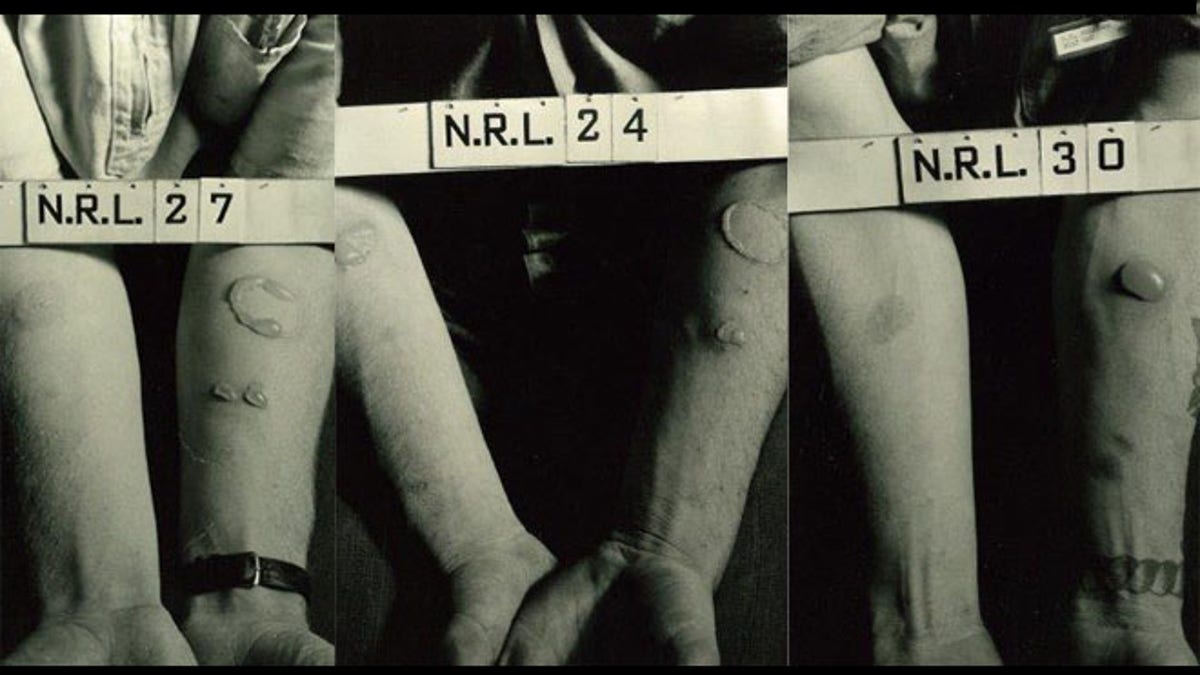
Images of the effects of mustard gas on soldiers' skin. (Photos: Naval Research Laboratory)
The U.S. military conducted experiments with mustard gas that singled out soldiers of specific races in an attempt to discover which ethnicity might have greater protection from chemical weapon attacks, an investigation has found.
Juan López Negrón, who's Puerto Rican, told National Public Radio that he was involved in experiments during World War II as part of what was known as the San José Project, named after the island in the Gulf of Panama where they were conducted.
López, now 95, remembered that the tests involved soldiers being sent out into the jungle-covered island and sprayed with mustard gas in a combat-like setting that was meant to simulate the South Pacific.
"We had uniforms on to protect ourselves, but the animals didn't," he recalled. "There were rabbits. They all died."
López told NPR that he and the other soldiers being tested got sick right away.
"I spent three weeks in the hospital with a bad fever,” he said. “Almost all of us got sick."
The Pentagon admitted in 1991 that they tested mustard gas on American troops and declassified some documents about the project two years later, but the racial aspect of the testing has been a closely-guarded secret.
According to NPR, some 60,000 American soldiers were involved in the tests. White enlisted men were used as scientific control groups to determine what would be considered a "normal" response to the gas, and then compared to the minority troops.
Japanese-Americans were tested to see how mustard gas might affect Japanese soldiers, while African-Americans and Puerto Ricans were singled out as possible “shock” troops that could be used on the frontlines in the case of chemical attack.
As Susan Smith, a medical historian who first raised the possibility of a racial element to the San José Project tests, put it, the U.S. military was seeking the "ideal chemical soldier."
There were three types of tests performed at Isla San José: applying liquid mustard gas directly to skin, outdoor field tests like López described and chamber tests in which mustard gas was piped into enclosed spaces where soldiers were.
The harmful effects of mustard gas include painful skin blisters and burns, leukemia, skin cancer, emphysema and asthma.
For decades, the tests were shrouded in secrecy. There’s little evidence of what was done, and the troops received no medical monitoring. What’s more, NPR said, the troops were ordered to keep quiet about the tests, prohibiting them from seeking medical care to deal with any residual effects because they were banned to inform doctors about the experiments.
"The first thing to be very clear about is that the Department of Defense does not conduct chemical weapons testing any longer," said Army Col. Steve Warren, director of press operations at the Pentagon. "And I think we have probably come as far as any institution in America on race ... So I think particularly for us in uniform, to hear and see something like this, it's stark. It's even a little bit jarring."
Rep. Barbara Lee, D-Calif., a member of the Congressional Black Caucus who sits on a House subcommittee for veterans’ affairs, told NPR: "I'm angry. I'm very sad. I guess I shouldn't be shocked when you look at the syphilis studies and all the other very terrible experiments that have taken place as it relates to African-Americans and people of color. But I guess I'm still shocked that, here we go again."
Lee said the government should reach out to the surviving troops who were part of the experiments.
"We owe them a huge debt, first of all. And I'm not sure how you repay such a debt," she said.
Like us on Facebook
